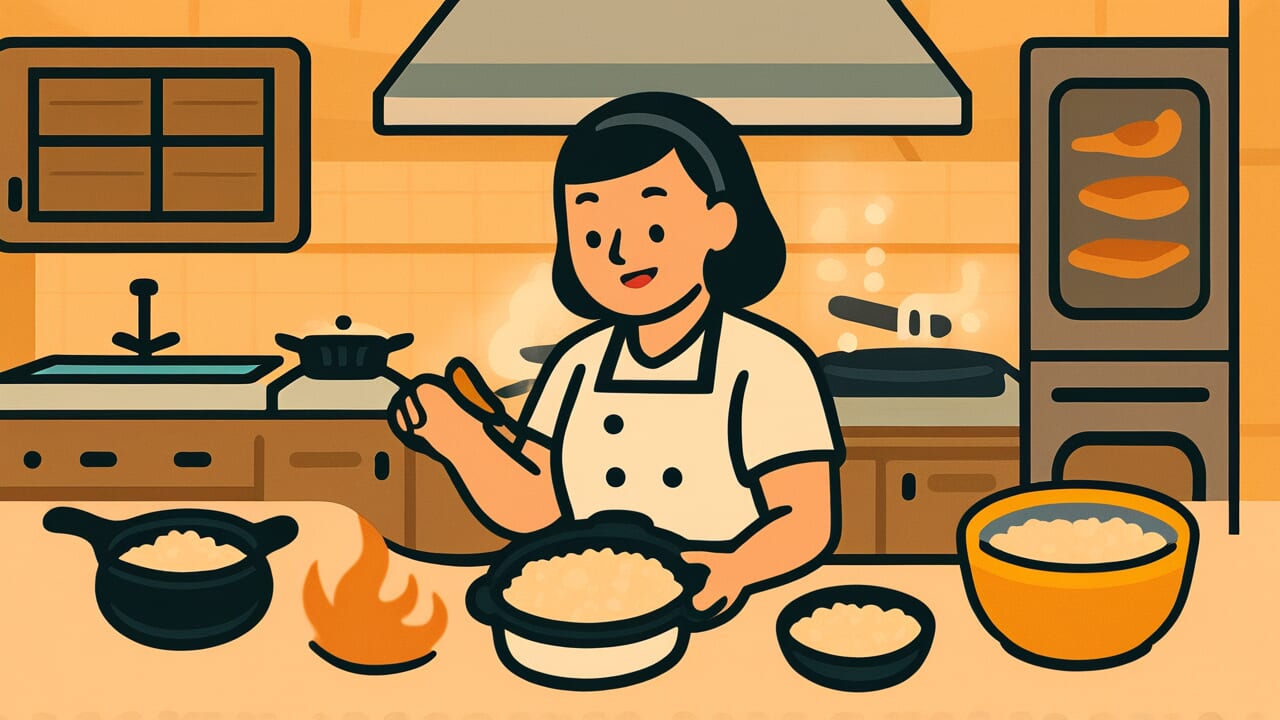How to Read “Rice over royal favor”
Oboshimeshi yori kome no meshi
Meaning of “Rice over royal favor”
This proverb means that real benefits and a stable life matter more than your boss’s mood or approval.
No matter how much your boss likes you, it means nothing if it doesn’t lead to actual income or better living conditions.
This saying shows a realistic view of what truly matters.
People use this proverb when someone focuses too much on pleasing their boss and loses sight of real benefits.
It reminds them to reconsider their priorities.
It’s also used when arguing that actual rewards and treatment matter more than formal praise or honor.
This thinking still applies today. Getting praised by your boss means little if your salary doesn’t increase.
High evaluations without real improvements in treatment don’t bring true satisfaction.
This proverb affirms the honest human sense that practical benefits matter more than appearances or formalities.
Origin and Etymology
No clear written records explain the origin of this proverb. However, we can make interesting observations from how the words are structured.
“Oboshimeshi” is originally the respectful form of the verb “to think.” It refers to the thoughts or intentions of someone above you.
During the Edo period, people frequently used this word when talking about their lord’s or boss’s wishes.
“Kome no meshi” (rice) symbolized the most basic and important food for common people at that time. It represented their livelihood itself.
This contrasting structure suggests the proverb came from common people’s everyday experiences.
In Edo period samurai society, loyalty to one’s lord and maintaining honor mattered above all else.
But to actually survive, people needed daily meals. They needed real income and stable living conditions.
Ideals and formalities alone don’t fill your stomach. This saying captures the honest feelings of ordinary people.
By placing the formal word “oboshimeshi” next to the common word “kome no meshi,” the proverb vividly contrasts formality with honesty, ideals with reality.
The structure itself shows the healthy distance common people kept from authority.
Interesting Facts
“Kome no meshi” (rice) in this proverb held special meaning for common people in the Edo period.
Poor farmers had to give the rice they grew as taxes. They often ate cheaper grains themselves instead.
Being able to eat white rice itself symbolized a wealthy and stable life.
The word “oboshimeshi” is rarely used today. But in the Edo period, it was a common respectful expression.
People called their lord’s thoughts “go-oboshimeshi.” Following those wishes was considered a samurai’s duty.
This proverb represents common people’s frank response to such feudal values.
Usage Examples
- A salary increase matters more than your boss’s approval. Rice over royal favor, you know.
- If the president likes you but you get no raise, maybe consider changing jobs. Rice over royal favor, after all.
Universal Wisdom
This proverb has been passed down because it addresses a universal conflict. We struggle between our survival instincts and our social position.
As social beings, we seek evaluation and approval from others. Favor from powerful people especially satisfies our self-esteem and gives us security.
But as biological beings, we cannot escape fundamental needs like eating and living.
When these two desires conflict, people often prioritize the former.
The psychology of not wanting to be disliked by your boss or have your evaluation drop takes priority over practical benefits.
This is an instinct we have as social animals. It’s nothing to be ashamed of.
However, our ancestors issued an important warning through this proverb.
If you become too trapped by submission to authority or the need for approval, you lose sight of what truly matters.
You lose sight of the foundation of your life and your family’s life.
Humans have the right to live with dignity. That dignity stands on the foundation of real, stable living conditions.
This is a simple but profound truth. This proverb teaches us priorities for living as humans, frankly and warmly.
When AI Hears This
In prospect theory experiments, people choose between “definitely receiving $30,000” and “50% chance of receiving $100,000.”
The expected value of the latter is $50,000, making it more advantageous. Yet about 80% choose the certain $30,000.
This proverb captures exactly this psychology.
“Oboshimeshi” (royal favor) might lead to great benefits in the future. But the probability of that happening remains unclear.
Meanwhile, rice in front of you has certain value. It fills your hunger right now.
What’s interesting is how the human brain makes nonlinear value judgments about certainty.
The relief when probability rises from 50% to 100% has more than twice the psychological value of rising from 0% to 50%.
In other words, being “certain” carries a special premium beyond mathematical expected value.
This proverb also hides an element of loss aversion. Current hunger is recognized as a “loss.”
The desire to eliminate it immediately works strongly. Kahneman’s research shows people feel the pain of loss about twice as strongly as the joy of equal gain.
We prioritize certain elimination of present loss over uncertain future gain.
This proverb accurately describes the design blueprint of human cognitive systems.
Lessons for Today
In modern society, this proverb’s teaching has become more important than ever.
Social media “likes” and praise from bosses provide instant approval. But real improvements in treatment and stable living have become harder to see.
This proverb teaches us not to be fooled by superficial evaluations. We need eyes to discern what truly has value in our lives.
This doesn’t mean becoming calculating. Rather, it explains the importance of having healthy judgment standards to protect your life and dignity.
If you’re spending a lot of time pleasing someone right now, stop and think.
Is it truly enriching your life? Relationships matter, but what matters more is a foundation where you and your loved ones can live with peace of mind.
Listen to the frank wisdom of our ancestors. Have the courage to value what truly matters.



Comments